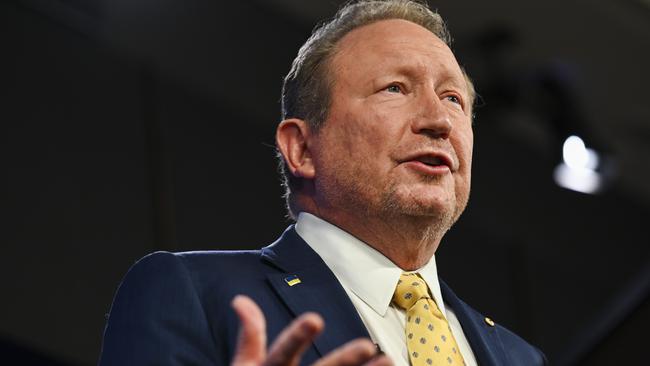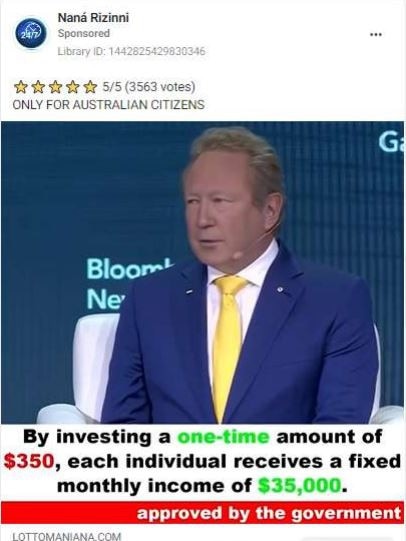‘Don’t care what it costs’: Forrest scores win against Meta in scam ad pursuit
Mining billionaire Andrew Forrest says he will spend ‘whatever it takes’ after securing a strategic win in a US court where he is suing the Facebook owner for failing to stop scams using his name.

Andrew Forrest says he has “won a crucial strategic victory” against Facebook owner Meta, with a US court allowing him to continue his pursuit of the tech titan, with the mining billionaire vowing he will spend “whatever it takes” to hold the company to account.
Dr Forrest is suing Meta, claiming the company did nothing to stop thousands of scams being published on its platforms that fleeced scores of Australians of their life savings, alleging it was “knowingly advertising the content of criminals”.
The California District Court said in its ruling that “Dr Forrest has plausibly alleged that Meta played an active role in creating the ads at issue”.
This is despite Dr Forrest receiving a blow to his campaign to protect the “innocent and vulnerable” in April when the Commonwealth Department of Public Prosecutions dropped the charges laid against the social media giant over its fraudulent advertising.
While Australian prosecutors dumped its pursuit, the US court also found that Dr Forrest had cause for action under California common law to claim for misappropriation of his name and likeness. Meta declined to comment, saying it was an “open legal case”.
It’s a significant move, given social media companies are immune from liability in the US for the content posted by third parties under a 30-year-old federal law known as Section 230– a position Dr Forrest is challenging.

The court’s ruling means that it will consider whether Meta has breached its duty by publishing the advertisements and operated in a way that facilitated scam ads, using defective screening and review procedures.
“This is a crucial strategic victory in the battle to hold Facebook accountable for the millions of dollars stolen from innocent Australians who have fallen victim to the duplicitous scams promoted on the Facebook platform,” Dr Forrest said.
“It marks the first time in the US civil court that a social media company has failed to succeed in using Section 230 immunity as a defence against civil liability for the conduct of its advertising business.
“The decision means we can seek to prove in court that Facebook can and should prevent displaying fraudulent ads on its site, while refusing to take any responsibility.”
Dr Forrest said he was prepared to “spend whatever it takes to hold Facebook’s directors and its leaders responsible”.
“I don’t care what it costs. I want to see them in the witness stand explaining their actions,” he said.
“For too long, Facebook has hidden behind an almost 30-year-old law to claim statutory immunity, shielding itself from accountability for scams flooding its platform. Facebook does not prevent fraudulent advertisements proliferating on the platform, luring innocent users into bad investments and losing their life savings.
“There must be systemic change in Facebook’s conduct. They need to be accountable under the law, like the rest of us,” he said.
The US case will now move to the discovery phase, and Dr Forrest’s lawyers will have the right to examine Facebook’s advertising platform and algorithms to understand how Facebook delivers scam advertisements to its users.
Dr Forrest’s lawyers will be seeking to see what processes Meta uses to screen advertisements for fraudulent content. Senior legal counsel Simon Clarke said it was no different to know your customer obligations that the banks and gaming sector must adhere to to avoid criminal infiltration across their organisations.
“What we are permitted to do is to look under the hood and say ‘OK, what are you actually doing between origination of an ad from criminal syndicate through your systems, platform, software review, etc, and what’s received by the user’. All in that process has been a black box that no one’s been allowed to look at, and they’ve been able to say ‘that’s all section 230, immunised’. No one’s actually been able to get in,” Mr Clarke said.
Meta has screening tools and has attracted praise from Australia’s eSafety Commissioner after it made almost 27 million of the 32 million reports of suspected child sexual abuse that non-profit, US-based organisation National Center for Missing & Exploited Children received from the major platforms last year.
“They paid billions so that they can scan all those images. They can’t do it (screen for fraudulent ads). They just choose to whom they apply it to,” Mr Clarke said.
“Clearly, I’d say, involves the dedication of certain computing resources that would slow the platform down to some degree.”
Dr Forrest first raised the fraudulent advertisements with Meta in 2014. Nothing happened. He personally wrote to Meta founder and chief executive Mark Zuckerberg, but didn’t hear back.
As a result of the lack of action, one Australian woman fell victim to a scam featuring Mr Forrest’s likeness and lost $670,000.
Another man clicked on a link in a fraudulent Facebook add and was swindled out of $77,254, and a A 72-year-old Western Australian known as “FZ” lost $250,000 – which he has not been able to recover.
Dr Forrest has also written to Meta’s Australian boss, William Easton, who replied: “I appreciate this is very frustrating for you – it’s an extremely challenging, industry-wide problem which we are working to address.”
It’s not just Australians voicing concern. Facebook scammers are also robbing Americans out of their life savings by impersonating billionaires, including hedge-fund manager Bill Ackman who, like Dr Forrest, has expressed his frustration at Meta’s inaction.
“It’s like a game of Whac-a-Mole,” McGill said. “It’s been a huge problem and all social media companies need to do more to prevent people from being scammed like this.”
The action comes after Meta switched off its news tab in April after it abandoned content deals with Australian media companies – a move that will rip about $70m a year from Australian newsrooms and breach a three-year-old code.
It has also attracted condemnation from law enforcement agencies over its plans to expand encryption on Facebook and Messenger – a decision that will have a devastating effect on the ability to detect and prevent child abuse.



